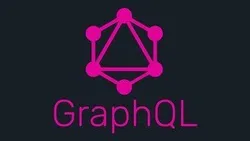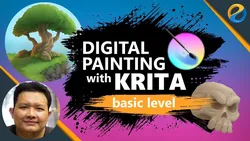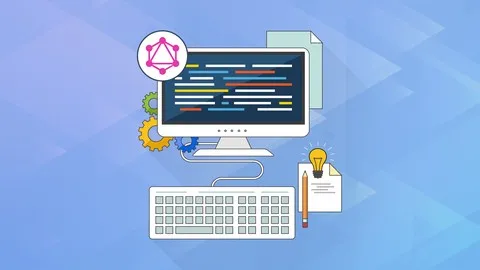
The GraphQL Apollo (with ReactJS NodeJS and MongoDB) 
This course provides an introduction to GraphQL and Apollo Client, teaching students how to build a movie application with ReactJS, NodeJS and MongoDB. Students will gain the skills to create a fully functional application using these technologies. ▼
ADVERTISEMENT
Course Feature
![]() Cost:
Cost:
Free
![]() Provider:
Provider:
Udemy
![]() Certificate:
Certificate:
Paid Certification
![]() Language:
Language:
English
![]() Start Date:
Start Date:
On-Demand
Course Overview
❗The content presented here is sourced directly from Udemy platform. For comprehensive course details, including enrollment information, simply click on the 'Go to class' link on our website.
Updated in [March 06th, 2023]
This course, The GraphQL Apollo (with ReactJS NodeJS and MongoDB), provides an overview of GraphQL and Apollo Client. Students will learn the basics of GraphQL, how it works, how to test it with the GraphiQL tool, how to set up a GraphQL Apollo Server, how to integrate GraphQL with ReactJS, and how to use MongoDB Atlas functionalities. The goal of the course is to make a MERN Movie Maker app and learn about GraphQL, Apollo Client-Server, ReactJS, and MongoDB. Students will learn what GraphQL is and why it is needed, how to write and fire GraphQL queries, how to make mutations, how to use the GraphiQL tool for testing, how to connect GraphQL with ReactJS using Apollo Client, how to store data to MongoDB Atlas, and how to add movies from the React frontend. By the end of the course, students will have a better understanding of GraphQL, Apollo Client-Server, ReactJS, and MongoDB and will have created a MERN Movie Maker app.
[Applications]
After completing this course, students will be able to apply their knowledge of GraphQL, Apollo Client-Server, ReactJS, and MongoDB to create a MERN Movie Maker app. They will be able to write and fire GraphQL queries, make mutations, and use the GraphiQL tool for testing. They will also be able to integrate GraphQL with ReactJS by Apollo and store data to the MongoDB database server. Additionally, they will be able to add movies from the React frontend and fetch them from the Database.
[Career Paths]
1. GraphQL Developer: GraphQL developers are responsible for designing, developing, and maintaining GraphQL applications. They must have a strong understanding of GraphQL, Apollo Client-Server, ReactJS, and MongoDB. They must also be able to create and maintain GraphQL schemas, write queries and mutations, and integrate GraphQL with other technologies. As GraphQL is becoming increasingly popular, the demand for GraphQL developers is expected to grow.
2. ReactJS Developer: ReactJS developers are responsible for developing user interfaces for web and mobile applications using ReactJS. They must have a strong understanding of ReactJS, JavaScript, HTML, and CSS. They must also be able to create and maintain React components, write code for React applications, and integrate React with other technologies. As ReactJS is becoming increasingly popular, the demand for ReactJS developers is expected to grow.
3. MongoDB Developer: MongoDB developers are responsible for designing, developing, and maintaining MongoDB databases. They must have a strong understanding of MongoDB, MongoDB Atlas, and MongoDB query language. They must also be able to create and maintain MongoDB collections, write queries and mutations, and integrate MongoDB with other technologies. As MongoDB is becoming increasingly popular, the demand for MongoDB developers is expected to grow.
4. NodeJS Developer: NodeJS developers are responsible for developing server-side applications using NodeJS. They must have a strong understanding of NodeJS, JavaScript, HTML, and CSS. They must also be able to create and maintain NodeJS applications, write code for NodeJS applications, and integrate NodeJS with other technologies. As NodeJS is becoming increasingly popular, the demand for NodeJS developers is expected to grow.
[Education Paths]
1. Bachelor of Science in Computer Science: This degree program provides students with a comprehensive understanding of computer science principles and their application in the development of software and hardware systems. Students learn the fundamentals of programming, data structures, algorithms, operating systems, computer networks, and software engineering. This degree is ideal for those interested in pursuing a career in software engineering, computer programming, or computer systems analysis. Additionally, the degree provides a strong foundation for those interested in pursuing a graduate degree in computer science.
2. Bachelor of Science in Information Technology: This degree program focuses on the application of technology to solve business problems. Students learn the fundamentals of programming, database management, web development, and systems analysis. Additionally, the degree provides a strong foundation for those interested in pursuing a graduate degree in information technology.
3. Bachelor of Science in Cybersecurity: This degree program focuses on the protection of computer systems and networks from malicious attacks. Students learn the fundamentals of computer security, cryptography, network security, and digital forensics. Additionally, the degree provides a strong foundation for those interested in pursuing a graduate degree in cybersecurity.
4. Master of Science in Artificial Intelligence: This degree program focuses on the development of intelligent systems that can learn and adapt to their environment. Students learn the fundamentals of machine learning, natural language processing, computer vision, and robotics. Additionally, the degree provides a strong foundation for those interested in pursuing a career in artificial intelligence or machine learning.
The development trends for these degree paths are rapidly changing as technology advances. For example, the Bachelor of Science in Computer Science is becoming increasingly focused on the development of software and hardware systems, while the Bachelor of Science in Information Technology is becoming more focused on the application of technology to solve business problems. Additionally, the Bachelor of Science in Cybersecurity is becoming more focused on the protection of computer systems and networks from malicious attacks, and the Master of Science in Artificial Intelligence is becoming more focused on the development of intelligent systems that can learn and adapt to their environment.
Pros & Cons

Good pace of instruction

Troubleshooting mistakes helpful

Fast intro to Apollo client

Steady pace for understanding concepts

Amazing workaround

Best for beginners

Awesome for beginners

Outdated

Extra packages not needed

Shorter ways to achieve goals

Errors connecting backend and frontend
Course Provider

Provider Udemy's Stats at AZClass
The GraphQL Apollo introduces GraphQL and the Apollo client, teaching students how to build movie apps using ReactJS and NodeJS, and MongoDB. Students will acquire the skills to create fully functional applications using these technologies. You'll also learn how GraphQL works by looking at various aspects of GraphQL such as writing and firing GraphQL queries, the syntax of queries, making mutations, and more. You'll also learn to use GraphiQL tools to test and understand how GraphiQL queries are generated and structured.
Discussion and Reviews
0.0 (Based on 0 reviews)
Explore Similar Online Courses

Getting Started with Azure Data Workloads

Digital Painting With Krita : Basic Level

Python for Informatics: Exploring Information

Social Network Analysis

Introduction to Systematic Review and Meta-Analysis

The Analytics Edge

DCO042 - Python For Informatics

Causal Diagrams: Draw Your Assumptions Before Your Conclusions

Whole genome sequencing of bacterial genomes - tools and applications

A Practical Guide to GraphQL: From the Client Perspective

Building Better APIs with GraphQL


Start your review of The GraphQL Apollo (with ReactJS NodeJS and MongoDB)